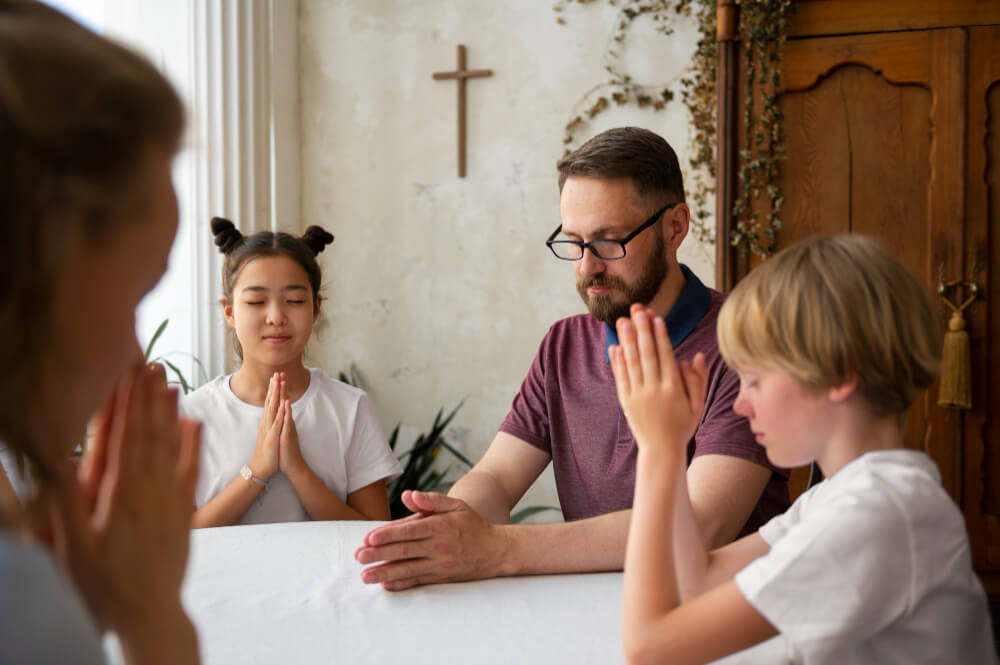As Christian parents, we carry a big responsibility: not just to prepare our children for college or careers, but to prepare their hearts and minds to know, love, and serve God.
Education shapes the way our kids see the world, themselves, and their Creator. That’s why more and more Christian families are choosing Christian classical education — an approach that doesn’t just inform the mind but transforms the heart.
Let’s explore what classical education is, why it matters, and how it can bless your family.
What Is Classical Education?

Classical education is an ancient approach to learning that has stood the test of time for over 2,000 years. Built on the framework of the Trivium — Grammar, Logic, and Rhetoric — it mirrors how God designed children to learn and grow.
- Grammar Stage (roughly K–5):
Young children are naturally wired to memorize and absorb facts. This stage focuses on laying a foundation: phonics, math facts, Bible verses, historical timelines, and the “building blocks” of knowledge. Songs, chants, and stories make learning engaging and fun. - Logic Stage (roughly 6–8th grade):
Around middle school, kids start asking big “why” questions. This stage emphasizes critical thinking and helps students make connections between ideas. They learn formal logic, debate, and start digging deeper into Scripture and the reasoning behind our faith. - Rhetoric Stage (roughly 9–12th grade):
By high school, students are ready to express and defend what they believe. In this stage, they learn to write persuasively, speak effectively, and integrate biblical truth into every subject. They’re trained to become articulate leaders who can engage the world with wisdom and grace.
In a Christian classical education, God’s Word is at the center of every stage. Math reveals His order, history unfolds His plan, literature reflects the human heart, and science shows His handiwork. Instead of teaching subjects as disconnected facts, classical education shows how all truth is God’s truth.
Why Christian Families Should Consider It
1. It Shapes the Heart, Not Just the Mind
Public education often focuses on filling students with information, but classical education is about formation — shaping who our children become, not just what they know. A Christian classical approach prioritizes wisdom, virtue, and godly character alongside academic excellence.
When our children study Scripture, history, art, and science through a biblical lens, they develop a deeper understanding of God’s design — and their place in it. They’re not just learning facts; they’re learning to love what is true, good, and beautiful.

2. It Teaches Kids How to Think, Not What to Think
In today’s culture, kids are constantly bombarded with messages that conflict with God’s truth. Christian classical education equips them to stand firm by teaching them how to think critically.
Through formal logic, deep reading, and meaningful discussions, students learn to analyze ideas, ask good questions, and measure everything they encounter against God’s Word. They’re not just memorizing answers — they’re learning discernment.
3. It Honors the Way God Designed Children to Learn
Children’s brains develop in stages, and the Trivium aligns beautifully with this natural progression. In the early years, they soak up facts like sponges. As they grow, they begin connecting those facts, questioning, and reasoning. Finally, they reach maturity where they can speak, write, and influence others.
Classical education works with your child’s God-given design, making learning smoother, richer, and more meaningful.

4. It Builds a Biblical Worldview
Every child grows up with a worldview — a lens through which they interpret life. In Christian classical education, Scripture isn’t just a subject; it’s the foundation. Kids learn to see all knowledge through God’s truth.
When they study history, they see God’s hand at work through time. When they study science, they marvel at His creation. When they read literature, they gain insight into the human condition and God’s redemptive plan.
This grounding protects our children from being “tossed back and forth by the waves” of culture (Ephesians 4:14). It helps them stand firm, confident in who they are and Whose they are.
5. It Trains Kids to Communicate With Grace and Confidence
In the Rhetoric stage, students learn to communicate truth with clarity and kindness — a skill desperately needed in today’s world. Whether they’re writing an essay, delivering a speech, or sharing their faith with a friend, they’re trained to engage thoughtfully and respectfully.
This equips them not only for academic success but also for kingdom impact.

6. It Strengthens Families
One beautiful outcome of Christian classical education — especially for homeschooling families — is that it brings the family closer together. Parents aren’t just outsourcing education; they’re actively discipling their children. Discussions about Scripture, history, and God’s design flow naturally from lessons into everyday life.
It transforms education into discipleship — exactly how God intended.
Preparing Kids for God’s Calling
At the end of the day, the goal of education isn’t simply to raise smart kids; it’s to raise wise, godly young adults who love the Lord and are prepared to follow Him wherever He leads. Christian classical education helps us do that.
It develops critical thinkers who are rooted in Scripture, who recognize truth, who seek beauty, and who live with purpose. It prepares our children not just for college, but for life — for serving God, their families, the church, and the world.
Proverbs 22:6 says:
“Train up a child in the way he should go; even when he is old, he will not depart from it.”
Christian classical education gives us the tools to live out that calling.
Christian families have the privilege — and the responsibility — to shape the hearts and minds of the next generation. By choosing Christian classical education, we give our kids more than knowledge. We give them a foundation of faith, a love of learning, and a vision for God’s glory in every part of life.
Because ultimately, education isn’t just about filling their heads — it’s about forming their hearts.




